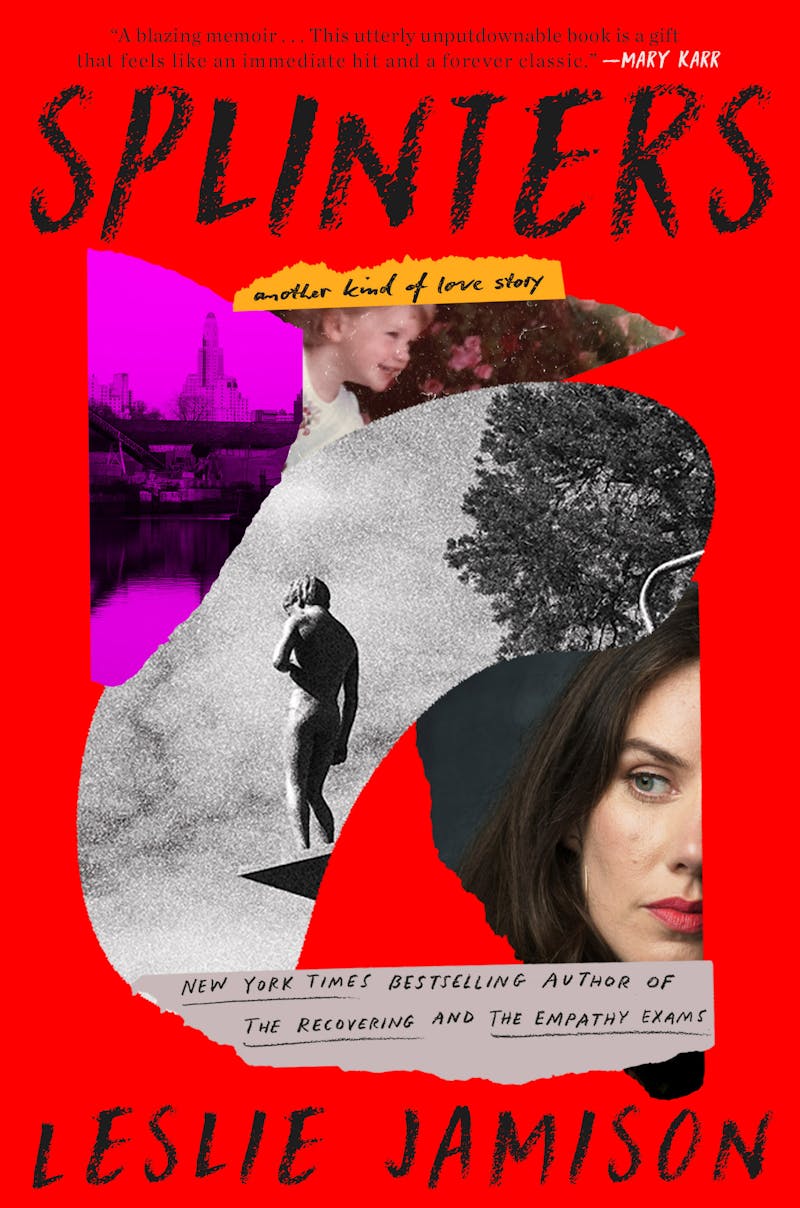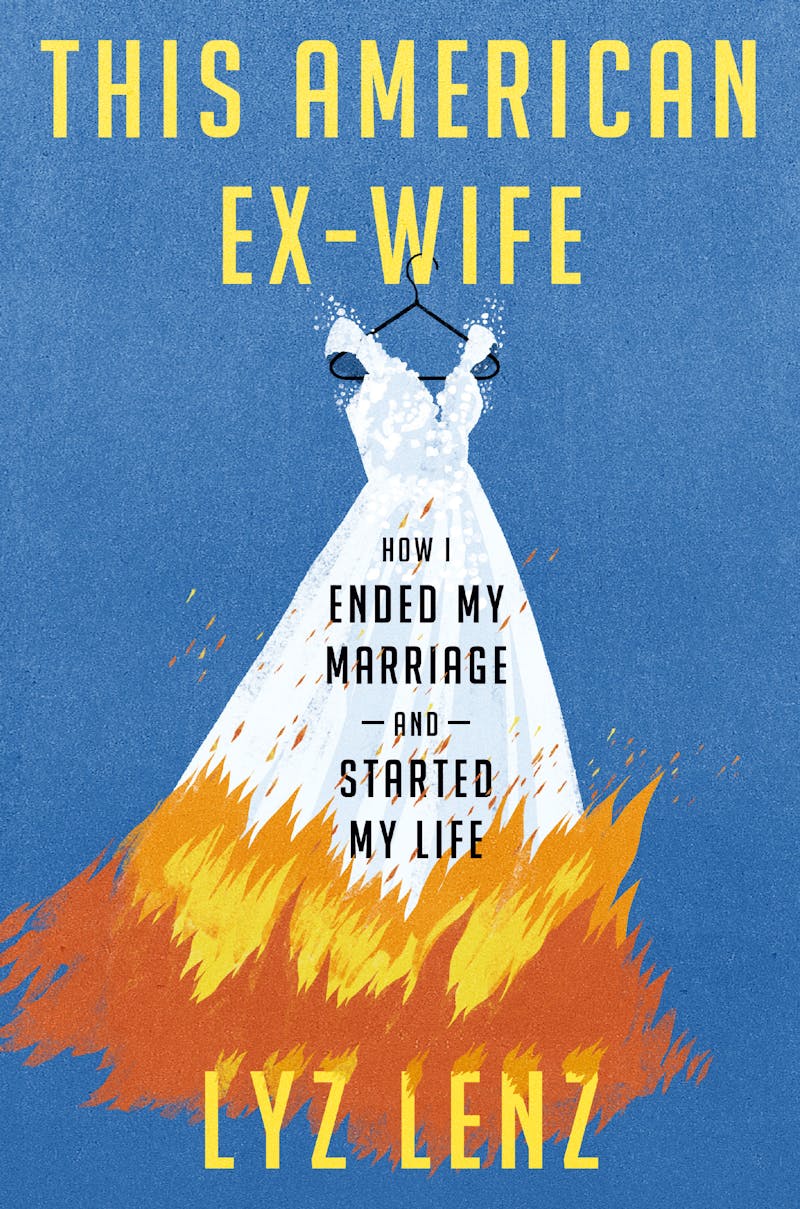Allow me to impart some important life advice: Do not divorce, or allow yourself to be divorced by, a memoirist. Regardless of what a marital saint you were, you’re not going to come off well in the retelling—if a public reckoning with an ex’s crimes weren’t somewhere on the agenda, would the divorce memoir exist as a genre in the first place? Nevertheless, dissecting a marriage at book length is a high-risk wager for an author: You will lay yourself bare for our scrutiny, and we will take your side. But will we?
Leslie Jamison’s Splinters and Lyz Lenz’s This American Ex-Wife are willing to chance it. For one thing, there’s shame to be expiated—both were the ones who chose to leave, and fear being judged badly for it. Plus the guilt—both had young children (Lenz’s were two and four, Jamison had a 13-month-old). But after grappling with a similar question—Is it legitimate to break apart your life to be happier?—both ultimately found divorce liberating. Outweighing the sorrow of ending relationships are, for both, relief and, even at this late date, the glow of hard-won victory—independence reclaimed from yellow-wallpapered conjugal enclosures. Jamison: “Once you’re finally out of a broken marriage, it feels like you’re just dripping with love.” Lenz: “True freedom and power begin with refusal.”

At a time when the discontentedly coupled are turning to energetic remedies for ailing marriages like swinging and polyamory—the couple that strays together stays together—it’s almost refreshing to hear anyone favor just euthanizing the patient. Lenz’s is the more political book, packed with stats about gender inequity and marshaling all the pragmatic reasons other women should follow her example, namely economic freedom from men and liberation from household drudgery. Jamison is more ruefully attuned to the way divorce means living with absent presences, the ghosts of past lives that didn’t happen. Both books occasionally left me pondering the wobbly distinction between candor about ex-intimates and score-settling, even when artfully executed.

Among the cul-de-sacs of modern coupledom is that the intimacy you once craved with a beloved also requires ongoing proximity to another needy human’s most jaggedly uncensored self, which is likely to be exactly what ends up putting you off them. Their deepest selves turn out to be rigid, angry, lying, and petty; they’re a bottomless well of hurt wrapped in sarcasm. There’s such a thing as getting to know someone too well, knowledge which can, of course, be weaponized, not to mention transcribed for literary posterity.
When Jamison met the novelist she calls C, she was 30; he was a widower in his mid-forties whose wife had died after a protracted battle with leukemia. They married after six heady months, eloping at a Las Vegas wedding chapel. There are some lovely sentences about him—“Falling in love with C … was like ripping hunks from a loaf of fresh bread and stuffing them in my mouth.” He got her face tattooed on his bicep. He was offbeat and made her laugh.
The marriage lasted five years, though they were in couples therapy the last four. The schisms kept growing, including tensions about disparities in their levels of career success. His first novel did well, while the second, a semi-autobiographical account of his first marriage, didn’t. Jamison’s bestselling essay collection, The Empathy Exams, had been a breakout hit. Compounding the injury, her latest book garnered acclaim and a 19-city publicity tour. He attempts to handle this graciously, though she also reports him once saying before a party, “I’ll be damned if I’m going to stand there holding your purse.”
Aha, one thinks—do I smell emasculation fear? Jamison is a savvy enough writer not to spell it out, also to emphasize that she’s telling just one side of the story. But as a well-known literary figure whose name will forever be linked, for better or worse, with the word empathy, she has a fan base that requires her to be relatable, thus she has some impression management to accomplish. When it comes to abandoning a man whose first wife had died tragically young, leaving him grieving and traumatized—who’s going to root for her in these circumstances, she admits to worrying.
The specter of C’s first wife loomed large in the marriage: “another woman’s death was nestled inside every moment between us. It was the house we lived in.” Jamison wants to believe she can repair C and assuage his suffering, though then there are occasions such as her talking about having had an eating disorder, and him interrupting to tell her how little his wife had weighed when she was dying. It leaves her feeling trivial by comparison, though also “some part of me had wanted to finish my sentence.”
Such is Jamison’s deftness at scene-sketching that an entire universe of botched reciprocity can be glimpsed in that moment, and the kernel of every disenchantment to follow. But how can one puny relationship encompass every injured party’s sensitivities and traumas simultaneously? How to adjudicate the clash of competing wants and wounds: I need this from you, but you’re giving me that.
Also C turns out to have anger issues. She’s drawn to his rough edges, less so to living with someone so easily affronted and short-tempered. His work is never going well. He can be mean. Daily life becomes a minefield of barbed comments that leave her frayed. He says a lot of shitty diagnostic things about her, none of which she’s forgotten, because some part of her believes them. According to him, even though she’s managed to convince the world she’s a good person, it’s all a facade—the true story is selfishness and ambition, “the virtue-signaling others mistook for virtue.” Jamison doesn’t defend herself, just lets his comments sit there stinking. “Where others looked at me and saw kindness, he saw the elaborate puppetry of a woman desperate for everyone to find her kind.”
When couples get this nastily ontological, they’re obviously spiraling the drain, but one of Jamison’s subtler talents turns out to be dexterity at table-turning. With the skill of a jiujitsu master, she neutralizes the opponent with his own weapon—repeating his taunts makes him look worse than she does. If she gets a little bloodied in the process, she also wins on sympathy points, which perhaps lends credence to his cynicism about her need to secure approval; but he’s vanquished by that point anyway. If you’re familiar with Jamison’s work, C’s assessments don’t necessarily seem wrong, they’re possibly even astute—she surrounds herself with yes-men, he charges, “part of an elaborate internal machinery designed to secure praise and affection from other people”—but the cruelty of him saying it is her get-out-of-jail-free card.
Reading the grisly details of other people’s fractured intimacies can be perversely fascinating, though in this case also disquieting, because C’s identity is no secret. And because, as Jamison explains in a brief paragraph, she’s agreed with C’s request not to write about his child from his first marriage. In other words, there was another person present throughout the relationship: C had been a single father when they met, making Jamison a stepmother when they married. The reader is left to fill in an even more painful story than the one Jamison is able to tell, because leaving C also meant leaving a child who’d already lost a mother. This is the kind of thing people love to judge.
After they separate, C’s meanness gets, no surprise, worse, which at least validates her decision to leave. “Why don’t you eat something, you anorexic bitch?” she reports him shouting during one of their twice-a-week child drop-offs. On another occasion, when she asks him to speak to her less angrily, he retorts, “I speak to you like you deserve.” His anger is protecting him from grief, she hypothesizes when he spits at (or maybe just distressingly near) her, after he’s had to wait 10 minutes outside her apartment because her buzzer is broken. A friend says that C’s anger is a sign of how much he loved her, but by then Jamison has decided it’s just who he is, and readers are likely to concur—you’d have to read very energetically against the grain to conclude differently.
Even if it’s an elegant hit job, Jamison is such a sheepishly charming persona on the page: Despite her shrewd observational acuity, she’s in a perpetual state of self-bafflement. Saddled with a psychology that demands her existence be justified, which necessitates “frantic” ambition, she’s so self-lacerating that she’ll happily accuse herself of every manner of failure, even that writing is a form of self-love and thus a kind of poison. She’s aware that people who want too many contradictory things from the universe can be exhausting—a friend confesses needing to step away because of drama fatigue—but the insatiability is also, she knows, her superpower as a writer; her big subject is the “great emptiness inside,” the only thing she ever really writes about. The compulsive self-effacement is a great way of deflecting her readers’ potential judginess: She is, after all, enviably talented, successful, and prolific, or, in the contemporary arsenal of finger-pointing, “privileged”—apologies for which arrive punctually.
Such are the hoops the socially attuned memoirist must negotiate. In addition to being adept at this, Jamison has a genius for quirky lyricism, for stretching the emotional lexicon into unexpected configurations. She knows her way around what T.S. Eliot called an objective correlative: Every children’s book she reads to her daughter, even if ostensibly about animals having picnics, is the story of her leaving her marriage; in Donald Judd’s cold and withholding sculptures is her relationship with her father and all subsequent impassive male faces; every cheesy movie plot evokes her own ordeals and yearning and disappointment. All this eloquence and self-scrutiny doesn’t appear to produce any greater contentment or self-ease, nor relationship success; it’s just a pathway to linguistic originality.
If they ran a contest for the best reasons to get divorced, Lyz Lenz would win hands down (a bigamy revelation would be a distant second). The whole time she was married, she seemed to be always mysteriously losing things. Her husband calls her absent-minded, and she agrees—she’d mislay her head if it wasn’t attached, etc., etc. Then, during a bout of spring cleaning, she discovers, stuffed behind the old wedding decorations in the basement crawl space, a box containing every item she thought she’d lost—coincidentally all items her evangelical husband disapproved of. A mug with the slogan WRITE LIKE A MOTHERFUCKER. A copy of Madame Bovary. Two favorite shirts. Their couples therapist makes him promise to stop hiding her stuff. (Is this really a sufficient response?) Six months later, another missing item—a little wooden sign that said, DRINK UP, WITCHES (one can’t help suspecting it was on display to goad him)—and she’s finally out the door.
This is a raw, angry, rabble-rousing book: “Do you want to know how I finally got my husband to do his fair share? Court-ordered fifty-fifty custody, that’s how.” For Lenz, the price of marriage was the loss of her entire self, and she’s decidedly bitter about the enterprise as a whole—“a political and cultural and romantic institution that asks too much of wives and mothers and gives too little in return.”
One of eight children, raised in small-town Texas and South Dakota by deeply conservative parents, Lenz pledged her purity to Jesus and her daddy at age 16 in exchange for a gold ring symbolizing chastity (though Daddy was himself a bit of a hound dog—as was Jamison’s father, incidentally). She attended a Lutheran college in southern Minnesota, and got engaged at age 22. Her fiancé was, it was clear—and well before they married in 2005—an uptight, controlling prig. He said her college friends were bad influences, and that she should keep her distance from them. Committed to faith and abstinence, he refused to sleep with her before marriage and wouldn’t allow wine to be served at the wedding. Lenz had wanted to keep her maiden name, having been published under it by then; he insisted she take his. On all this she acceded.
Married life somehow failed to make him any more of a compromiser. Reluctantly, Lenz moved to Cedar Rapids for his job, with promises that someday they’d move for hers (which never happened). They buy a horrible moldy house that comes to seem like a metaphor for their marriage. He’s bossy about the renovations and, ever the gaslighter, insists the rot doesn’t smell as bad as she thinks. Much of the book is devoted to housework wars: She wants him to do some, he wants her to write less. He tries to persuade her to have a third kid rather than embark on a book: “It soon became clear I could be successful or I could be married.” Though he’s “a good man,” the sex sounds awful—Lenz has some tart things to say about men’s failures of reciprocity in oral sex—and after 11 years and countless couples therapy sessions, she’s done.
But, as Lenz herself says, her husband never pretended to be anyone other than who he was: someone who wanted a tradwife. She was the one who changed. That’s a fascinating story, but the book is wrongly framed, reaching too often for sweeping pronouncements about sex and gender: “Women and their work have always been disposable”; “We make women feel brave for sticking it out”; “We tell ourselves that true love happens completely outside of the forces of culture and time.” But Lenz isn’t the American ex-wife. She is chronicling a highly specific milieu: white evangelical Trump country. Breaking ranks with religious traditionalism meant breaking not just with her husband, but with a tribe devoted to controlling women’s bodies and, not incidentally, shoving their doctrine down the rest of America’s throat.
Her husband, no surprise, supported Donald Trump in 2016, while Lenz voted for Hillary Clinton. The connection between their domestic miseries and the evangelical political agenda, between her husband’s Trumpism and the inequalities in their marriage, would have been a great subject to explore, but Lenz turns to generalities instead. It’s a very didactic book—like most converts to a cause, she wants to instruct a flock—but the lessons are rote ones, marshaling citations from Henrik Ibsen, Simone de Beauvoir, Betty Friedan, Susan Faludi, and Arlie Russell Hochschild to make familiar arguments about equal pay, housework inequities, and the disparities in women’s sexual pleasure versus men’s. It’s like Feminist Groundhog Day.
The one feminist issue we never hear about, oddly, is abortion. I take her Clinton vote to mean she’s pro-choice, and her husband’s Trump vote to mean he was not. What kind of conversations did that entail? Or birth control discussions, or prenatal testing decisions? We don’t hear, though Lenz does report discovering in year seven of their marriage that her husband was anti–gay marriage, leaving her “stunned and embarrassed.” But could this possibly come as news to someone who’d married a sex-fearing evangelical?
It’s not that gender inequalities don’t persist in secular America, but they persist differently than in the tradition-bound world Lenz inhabited. The more she strives to present herself as Everywoman, the more empty truisms pile up: “Sexuality is a spectrum, and so are our relationships,” “Divorce is both personal and political,” “Rarely do we consider what must be exchanged for a life lived with someone else.” The condescension started making me querulous—I feel pretty sure that literary history is teeming with tales of marital self-mutilation, and that lots of us have considered them plenty, not that such a reading program necessarily improves things on the domestic front.
This framing is too bad, because when Lenz observes the world she knows, as she did in a previous book, God Land, she’s textured and insightful. The journey from evangelical to Hillary voter to divorcée is meaningful not because it’s the shared condition, but because of what a rare bird it makes her, a minority of a minority. Despite their outsize political clout, only 14 percent of the electorate are white evangelical Christians, and a mere 16 percent of them supported Clinton. But if women in the heartland are in the throes of late-breaking feminist rage, fleeing their Trump-voting, bad-in-bed husbands, this is great news. Welcome aboard, all escapees and renegades!
Post-separation, both Lenz and Jamison embarked on sex and dating sprees involving apps, shifty men, and self-discovery; freedoms are regained, dignity is lost. Both think it’s their fault when men dump them.
Jamison is drawn to trouble and intensity—she’s not giving up on recklessness, and good for her. She meets a charismatic traveling musician with tattoos and healed cutter scars on his arms, who finds monogamy impossible, fucks her in ways she’s never been fucked, and gives her chlamydia (about which she’s amusing—googling whether it can be transmitted through breastfeeding, a nice little glimpse at the perils of wanting everything). She yearns, improbably, to tame him and settle down together (there’s also a hilariously self-deluded sentence about feeling maternal toward his other girlfriends), though his self-mythologizing starts to strike her as a failure of imagination, a way of staying stuck: “He was a man in love with the way he broke things.” Even when Jamison is skewering men, she doesn’t reduce them to their gender: Each is a motley collection of specifics. The problem is that she keeps seeing through them—and thus does hotness fade.
Lenz finds herself equally baffled by her desires: “So much of my life had been ruined by men…. And yet, I still wanted them.” She discovers at long last that sex can be pleasurable, though the men she meets are invariably assholes. Including or especially the supposedly enlightened liberals and male feminists, one of whom rapes her in his apartment, though she doesn’t use that word.
An inherent risk of the divorce memoir is that the memoirist, naturally steeped in resentment and tacit self-exoneration, may be the person least equipped to tell the story. You end up second-guessing them, as when Lenz says, about her husband’s anti-gay politics, “How had I failed to see the truth?” or asks plaintively, “How had I gotten here?” Well, as she herself says, marriages are built on intentional ignorance. Which is also the pitfall for confessional writers generally: You’re producing a map of your blind spots, and if you do it at all well, your readers will likely come to feel they know you better than you know yourself.
When Jamison mentions loving a line from G.K. Chesterton—“How much larger your life would be if your self could become smaller in it. You would find yourself under a freer sky, in a street full of splendid strangers”—I couldn’t help noticing that it was an aspiration supremely at odds with the emotional maximalism of her book and its relentless interior gaze, none of which is exactly a self-reduction plan.
Would the divorce story of one of these imaginary slimmed-down selves be in any way interesting? The thing that makes divorce memoirs so compelling is knowing what an ongoing calamity it is to attempt to merge two gargantuan interiorities. But such is our condition, living as we do in self-besotted times. We’re very avid about ourselves! Perhaps most of all. It makes even the failed mergers poignant. You spend a lifetime figuring out how to navigate your befuddling, outsize emotions, and then you die, though if you’re fortunate, you’ll have loved and felt loved somewhere along the way by someone willing to put up with you in all your helpless enormity.




